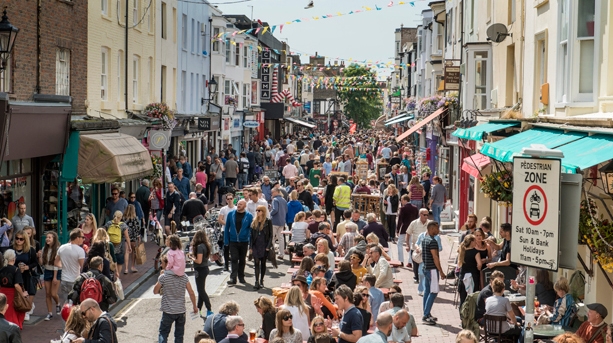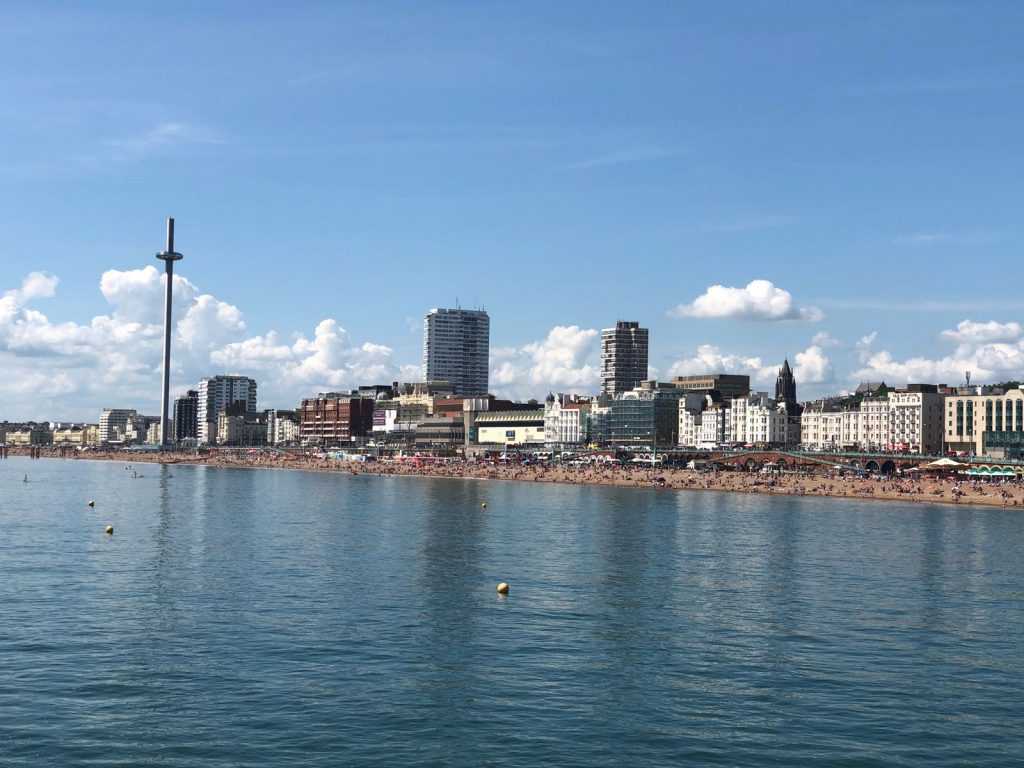This update is a snapshot of the impact of the covid-19 pandemic on the city’s economy and, in particular, for tourism, events and culture.
Accurate data on the numbers of businesses and individuals adversely affected in the city is not yet available so information has been extrapolated from national sources.
General economic impact
Recent research from the Centre for Cities indicates that just over 30 per cent of jobs in Brighton and Hove are in sectors likely to be unaffected or have higher demand as a result of the pandemic. For example, jobs supporting online services such as gaming.
From the remaining 70 per cent, just over 35 per cent of jobs are in sectors classed as affected and 35 per cent either vulnerable or very vulnerable.
According to the Annual Population Survey, there were 29,500 self-employed people living in Brighton and Hove as of September 2019.
The Institute for Fiscal Studies suggests that self-employed people are disproportionately working in sectors that are most likely to be impacted by covid-19, for example, personal services, arts and leisure and passenger transport (eg, taxi services).
Retail is an important employer in the city, with over 15,000 people employed in the sector. The small independent shops which make Brighton and Hove unique are under considerable pressure as rents are due and stock remains unsold.
Visitor economy
Recent reports indicate that up to 50 million jobs worldwide will be lost in the tourism and travel industries as a result of the pandemic.
Research indicates that many tourism businesses in the UK will struggle to survive beyond July if the lockdown prevents some recovery of the visitor season.
Compared to last year, revenues for April have already declined by around 90 per cent and forward demand is low due to ongoing uncertainty.
There are numerous examples across the city where businesses continue to innovate in response to the situation, moving online to serve local people.
The impact of the virus on the aviation industry will also have a knock-on effect for Brighton and Hove.
Research indicates that people arriving into Gatwick generated 1.8 million overnight stays (plus ancillary spend) in the city over 2017.
Passenger flights have currently reduced by 95 per cent in UK airports, including Gatwick.
There is some optimism that mass gatherings may resume early in 2021, enabling elements of business tourism – for example, small local conferences.
Around a third of business tourism suppliers believe there is pent-up demand for events but almost half believe that people will be reluctant to travel.
Events
All festivals and all major public events in the city have been now been cancelled until September 2020 but increasingly government guidance suggests that mass gatherings could be the last to emerge from lockdown.
When public gatherings at events are permitted, evidence from other parts of the world suggest that attendance levels will not be immediately restored.
In Brighton and Hove, the impact of this is likely to be a loss of revenues in excess of £100 million.
For reference, in 2018-19 Greater Brighton’s performing arts sector directly turned over £329 million and employed 3,500 people.
This sector is very important to the visitor economy in the city, and the loss of the Brighton Marathon in April, the May festivals and Pride in July is a major blow for the entire year.
This is because the majority of visitor income is generated from the beginning of April to the end of September.
This is also true for income generation at major attractions such as the Royal Pavilion and Museums.
Culture
Theatres, venues, and museums have all been closed for over six weeks and revenues have ceased. The majority of staff in the city’s venues are currently furloughed.
The cultural sector relies heavily on freelance, self-employed people and on small limited companies.
Many of these talented people are now seeking universal credit as their only means of income.
If they are forced to leave the sector entirely, which is likely if lockdown continues, there will be a long-term negative impact for Brighton and Hove as the UK’s most vibrant city for the arts and culture.
Cultural organisations are also charities which rely on donations. As a result of the pandemic, philanthropy is being redirected towards health-based causes, with arts and culture at or near the bottom of charities receiving donations.
However, it is the arts and culture that is contributing massively to wellbeing at this time as artists and performers use online platforms to bring comfort to millions of people.
Covid-19 response: events and economy
In February the council established a formal covid-19 crisis response group and a series of workgroups. These workgroups have been active across the city, from supporting vulnerable people to securing supplies of personal protective equipment.
The “events and economy” workstream has been focused in the following areas.
All retail, leisure and hospitality businesses in the city have now been advised by the council that they will receive business rates relief for 2020-21 at a cost of £70 million.
In addition, the council is quickly distributing the government’s business grant for the retail, leisure and hospitality sectors linked to the rateable value of their premises (valued under £51,000 per annum).
Over 2,500 business have received in excess of £33 million already.
By mid-May officers expect to have paid these grants of £10,000 and £25,000 to over 3,500 organisations in the city, with more complex cases being analysed as quickly as possible to enable cash release.
In the region of £73 million will be distributed.
The council has also deferred commercial rental payments, currently until the end of June 2020, for those tenants in our properties who have advised us they unable to pay because of the impact of covid-19.
The council has no discretion on suspending or waiving licensing fees, for example, for taxis, and these are being charged as normal.
Officers have been working with public and private sector partners, including the Arts Council of England, the Coast to Capital LEP (Local Enterprise Partnership) and the Greater Brighton Economic Board, on measures required to support artists, freelancers and small businesses through this lockdown period and beyond.
Recovery
On (Thursday) 30 April the Policy and Resources Committee considered a paper outlining a recovery programme for Brighton and Hove.
The covid-19 outbreak represents an unprecedented challenge and a major shock to the city’s economy and communities.
After the initial focus on the immediate crisis response measures, the council and its partners need to consider the longer-term implications and start planning a recovery programme to support the city once the outbreak stage of the virus has completed.
The programme is to develop a co-ordinated recovery programme that will guide the city and the council through the transition from the emergency response of the outbreak phase of the pandemic towards the steady state post-pandemic city.
It is recognised that this might not be a linear transition through recovery but a series of phases which may see the city move in and out of restrictions to control the covid-19 outbreak.
While the programme will focus upon recovery, it will also seek opportunities for positive change to shape the future of the city.
The programme will establish a governance structure for initiating and organising a series of coordinated multi-agency actions during the recovery stage(s) following the covid-19 outbreak affecting the communities and/or environment of Brighton and Hove, including cross-party oversight through a Policy and Resources (Recovery) Sub-Committee.
Longer-term prospects
In mid-April Visit Britain prepared a domestic tourism impact model for 2020 assuming lockdown ends at the beginning of June, followed by a slow opening of services from June to August.
They then assumed a bounce-back period in the final four months of the year when some categories of leisure spend benefit from pent up demand.
This optimistic modelling, which Visit Britain stresses is one possible outturn, shows a whole-year reduction of 32 per cent in overnight tourism and 21 per cent in day trips for the UK when compared to 2019.
It is anticipated that, when lockdown is eased, Brighton and Hove will see a return of people making day trips and weekend visits because “staycations” are widely anticipated to surge. This upturn, especially if the weather remains fine, may provide a lifeline for businesses across the visitor economy.
International travel is expected to remain at a low level until at least spring 2021. For the cultural sector, there continues to be a major opportunity to move content online and to monetise this. For example, the Brighton and Hove Music Service will be delivering online lessons to 3,000 children over the summer.
As mentioned earlier, there is significant engagement with the arts and all forms of creativity online as nationally people seek out music, poetry, literature and performance.
However, many artists and creative organisations remain unable to make a living although new government-backed loans of up to £50,000 may provide a financial lifeline for some.
The city’s venues will have to work within social distancing guidelines to enable them to open again and business models will have to evolve.
The development of 5G technologies to enable the sharing of online content will be critical. For example, Brighton Dome and Wired Sussex are currently leading a consortium bid to the 5G Create fund with partners.
Covid-19 may present an opportunity to reshape some of the retail offering in Brighton and Hove as some larger operators exit, leaving units empty.
The future of the “high street” can increasingly be viewed as providing locations for social integration, leisure, accessing health and wellbeing services as well as creating places to relax and placing emphasis on cultural exchange and experience.
The city has vibrant and well-established independent retail and cultural sectors, although these are currently under great strain, and a long history of business model innovation.
It is anticipated we can be at the forefront of a new approach to city regeneration which places community wealth building and the circular economy at its heart.
Donna Chisholm is the assistant director for culture, tourism and sport at Brighton and Hove City Council. This report was written as an update for the council’s Tourism, Equalities, Communities and Culture Committee.










“Coronavirus places huge strain on health of Brighton and Hove economy” …… Stating the obvious..
We were talking yesterday about the problems – the end of conferences, and so on – that will now face the i360 which are compounded by British Airways’likely collapse. Nothing has been printed avout that there.
Music Venues Trust has now raised 1.2nillion to support grassroots music venues – key part of the arts in Brighton – and that shows public donations to the arts they love have far from dried up… we need joined up Brighton approach to theatres galleries comedy venues ( that’s arts to me esp The Treason Show )
That money raised owes a lot to a few people from Brighton who are brilliant…. and who work with Mark and Bev at MVT and with others all over UK to protect the music sector! Toni, Lucy, Davina, thank you all!!!!
So my message is simple to council officers…. get everyone on board…. music venues and comedy venues matter and heh some previously unrecognised sectors may have solutions for all…..